Onions are one of those vegetables that a lot of people shy away from.
Sometimes, they even cry about them.
…You didn’t really think you could get through this without an onion joke, did you?
The truth is that people who dislike onions have no idea what they’re missing out on! Onions are not only flavorful, they’re also full of healthy nutrients and can be used in countless dishes.
So today we’re going to talk about why you should be eating more onions.
Onions Are Nutrient-Dense
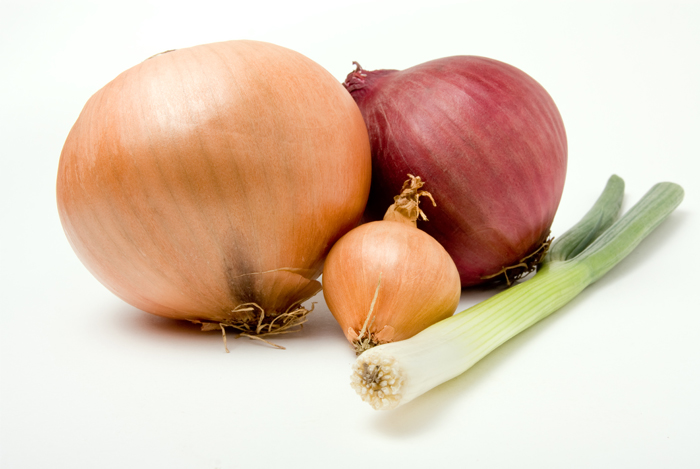
There’s a great reason why onions are a staple food in the cuisine of dozens of cultures worldwide.
Onions are naturally low in calories but high in a multitude of beneficial nutrients. One cup of chopped onion contains approximately:
- 64 calories
- 15 grams of carbohydrate
- 0 grams of fat
- 0 grams of cholesterol
- 3 grams of fiber
- 7 grams of sugar
- 2 grams of protein
Eating onions on a regular basis provides your body with the following nutrients:
- Biotin
- Chromium
- Copper
- Folate
- Manganese
- Phosphorous
- Potassium
- Quercetin
- Vitamin B1
- Vitamin B6
- Vitamin C
Onions also contain important phytochemicals like disulfides, trisulfides, cepaene, and vinyldithiins.
According to the National Onion Association, these nutrients are helpful in maintaining proper health and even provide anticancer and antimicrobial properties.
Quercetin

Quercetin is a powerful antioxidant with anti-inflammatory properties found in onions.
Studies have shown quercetin could prevent histamine releases that lead to allergic reactions – which makes quercetin-rich foods (like onions!) a sort of natural antihistamine.
And according to the University of Maryland Medical Center, quercetin also reduces the symptoms of bladder infections, promotes prostate health, and lowers blood sugar.
History of Onions
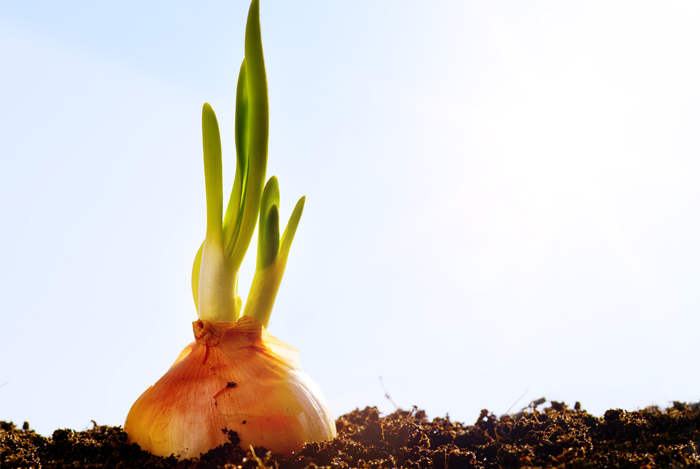
There are two main varieties of bulb onions.
First, there are storage onions. These are available year-round and include yellow, white, red, and Spanish onions.
Then you have seasonal onions, which include sweet Vidalia and pearl onions.
Onions were first cultivated in Asia over five thousand years ago, and were common among the ancient Egyptians, Indians, Romans, and Greeks for a number of purposes. Some pharaohs in ancient Egypt were even buried in their tombs with onions so they could eat them in the afterlife!
Onions are likely one of the earliest crops because they are less perishable than other foods of the time and are extremely transportable and easy to grow in a variety of soils and climates.
And it’s great that our ancestors had such access to onions because they are positively brimming with awesome health benefits!
Health Benefits of Onions
Heart Health

Onions encourage a healthy heart by lowering blood pressure and lowering heart attack risk.
A 1987 animal study in the Journal of Hypertension found that sulfur intake delayed or reduced the onset of hypertension.
Onions also act as anticoagulants, or blood thinners, which prevent your red blood cells from forming blood clots. Studies have shown that onion extract stops these blood clot formation and can help to improve or prevent cardiovascular diseases.
According to the University of Maryland Medical Center, the quercetin in onions could also help prevent plaque buildup in the arteries, which reduces the risk of heart attack and stroke.
Immune Health
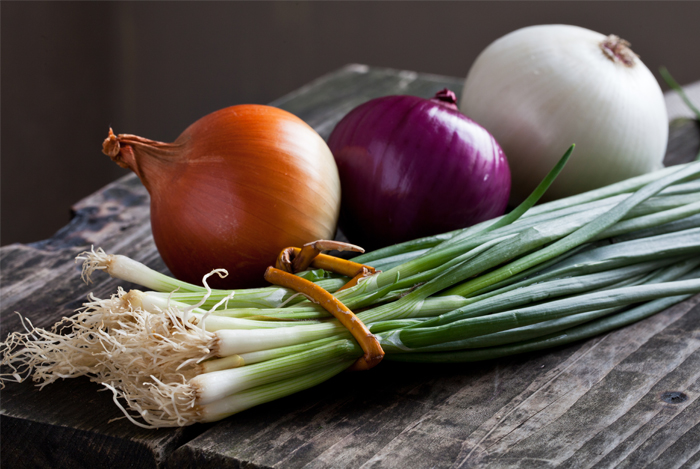
According to Anne Mauney, a dietitian from Washington, D.C., “The polyphenols in onions act as antioxidants, protecting the body against free radicals.”
The polyphenol content is a lot higher than you might expect. It’s not only higher than other similar vegetables like garlic and leeks, but also higher than tomatoes, carrots, and red bell pepper.
Onions are also very high in flavonoids – nutrients that are famous for their antioxidant and anti-inflammatory health benefits.
Anti-Cancer
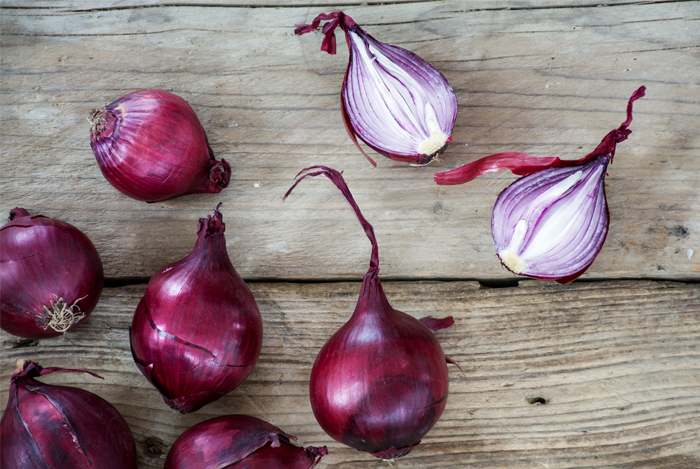
The active compounds in onions may be able to inhibit the development and spread of cancerous cells.
Quercetin – a powerful antioxidant compound – has been consistently linked to the prevention or reduction of the spread of cancer. Because onions are so high in quercetin and other antioxidants like vitamin C, they help the body fight off dangerous free radicals that cause otherwise healthy cells to become cancerous.
A recent study from the Netherlands showed that people who ate onions regularly absorbed twice as much quercetin as those who drank tea – and three times more than those who ate apples. Red onions in particular are high in quercetin, as well as shallots and yellow onions.
A population based, case-controlled study that investigated the relationship between allium vegetables and prostate cancer found that men who ate the most allium vegetables had the lowest risk for prostate cancer.
And because everyone is susceptible to the effects of oxidative stress and the damage of free radicals, everyone should take advantage of any food source that is abundant in antioxidants.
Sleep and Mood

Onions and all allium vegetables (including garlic, leeks, chives, shallots, and spring onions) have been associated with positive mood effects.
Onions are high in folate, which could help treat depression.
Folate prevents an excess of homocysteine from forming in the body, which can prevent blood and other nutrients from reaching the brain. Too much homocysteine interferes with the production of the hormones serotonin, dopamine, and norepinephrine, which regulate mood, sleep, and appetite.
Digestion and Stomach Health

Onions are also high in fiber, which promotes good digestion and keeps you regular.
The soluble fiber called oligofructose is found in onions, and it promotes good bacterial growth in your intestines. A 2005 study in Clinical Gastroenterology and Hepatology found that oligofructose could help to prevent and treat diarrhea.
Allium vegetables like onions are inversely related with the risk of esophageal and stomach cancer.
Many studies on humans have demonstrated the protective effects of consuming these vegetables, as well as reports of tumor reduction following the administration of allium compounds in experimental animals.
Anti-Inflammatory
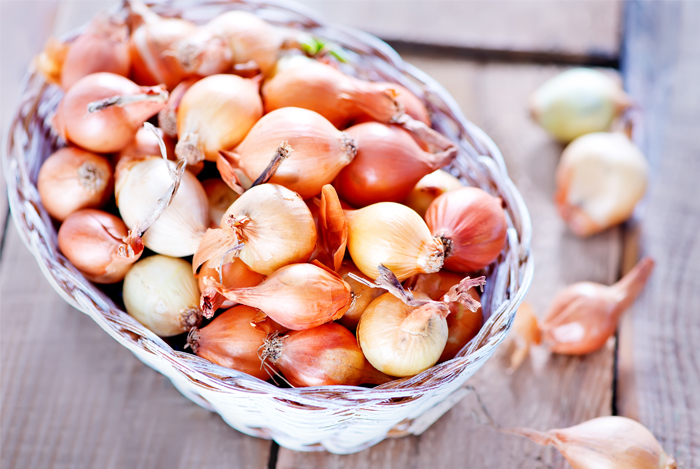
The sulfurs found in onions are thought to be effective anti-inflammatory agents, according to a 1990 study published in the International Archives of Allergy and Applied Immunology journal.
Onionin A – one of the unique sulfur molecules found in onions – has been shown to inhibit the activity of macrophages, the specialized white blood cells that play a key role in our body’s immune defense system.
One of their main activities in the body is the triggering of large-scale inflammatory responses – something that can lead to chronic, unwanted inflammation if left unchecked.
Another study suggested that quercetin could relax the airway muscles and provide relief of asthma symptoms.
Anti-Bacterial

Onions have been shown to prevent bacterial infections because of their sulfur compounds and the flavonoid quercetin.
While onions may give you peculiar breath, studies show that these nutrients in onions fight off the bacteria Streptococcus mutans and Streptococcus sobrinus, which are commonly involved in the production of tooth cavities.
And, according to World’s Healthiest Foods, Onions also have been shown to fight off periodontal disease bacteria, including Porphyromonas gingivalis and Prevotella intermedia.
Bone Density

One study from 2009 in the journal Menopause found that women who consumed onions on a daily basis improved their bone density while they went through or had finished menopause.
The most frequent eaters of onions even had a 20 percent lower risk of hip fracture than women who never ate onions.
Diabetes Management

One relatively unusual mineral found in onions is chromium, which helps the body manage blood sugar levels. Chromium ensures the gradual release of glucose to the muscles and body cells – so eating onions can help modulate your blood sugar levels.
A prebiotic nutrient in onions called inulin has multiple health benefits, which include fighting against diabetes. Women with type 2 diabetes who inulin had improved glycemic control and increased antioxidant activity.
Diabetics, whose bodies have trouble regulating glucose levels, could benefit from incorporating more onions into their diets.
How to Prepare and Eat Onions

The flavonoids in onions are more concentrated in the outer layers of the flesh. So, to maximize your potential health benefits, peel off as little of the edible portion as possible. Remove only the papery outermost layer.
The ideal onions are dry and firm with little to no scent before they’re peeled. You should try adding onion for flavor whenever possible because they pair well with most dishes.
You can sauté, roast, grill, or caramelize onions.
You can also use them as a delicious topping for sandwiches, dice them up and toss them into a salad, or add them to salsas or dips like guacamole.
The Health Risks of Onions

Onions pose a few health risks that we should cover briefly.
According to the National Digestive Diseases Information Clearinghouse, the carbohydrates found in onions can cause gas and bloating.
If you suffer from chronic heartburn or gastric reflux disease, raw onions can actually worsen your heartburn symptoms.
If you take blood-thinning drugs, eating large amounts of green onions can interfere with their effects. The vitamin K found in green onions can decrease blood thinning, according to the University of Georgia.
In some very rare cases, you could have an intolerance or allergy to onions. An article in the Journal of Allergy and Clinical Immunology explained that people with onion allergies could experience red, itchy eyes, rashes, nausea, vomiting, and other types of gastric discomfort.
One of the best ways to prevent onions from causing any further issues is to make sure they’re fresh. They keep for a long time, but they can still spoil eventually – so try to never use a bad onion.
If you ask me, you should be crying tears of joy every time you cut open an onion. They’re such interesting, delicious, and nutritious vegetables!
So, if you don’t already, I think it’s time you started eating more onions.
How big a fan of onions are you? Will you start incorporating onions in even more dishes than ever before?
Share your thoughts in the comments below!
The post Why You Should Be Eating More Onions appeared first on Nutrition Secrets.
http://www.nutritionsecrets.com/why-you-should-be-eating-more-onions/
No comments:
Post a Comment